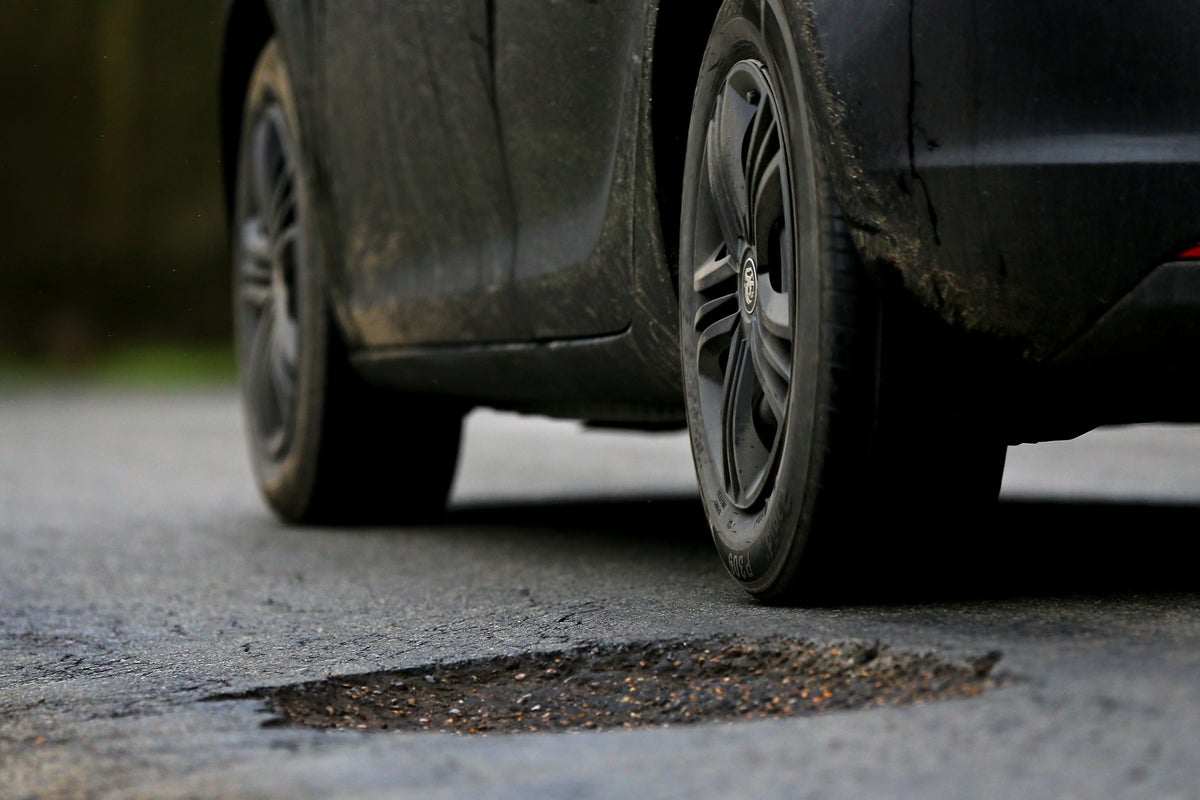
Drivers’ anger at the condition of local roads has reached an eight-year high, with a third of drivers swerving to avoid a pothole, a new survey suggests.
Some 49% of respondents to a poll of 2,583 UK drivers commissioned by the RAC said the issue was their biggest motoring concern.
This is the highest proportion recorded in the annual survey since the motoring services company began asking drivers for their views on the state of local roads in 2015.
The previous high of 46% was in 2021.
In the latest poll, two-thirds of those questioned said the condition of the local roads they regularly drive on had deteriorated in the previous 12 months.
One in three (35%) respondents said they had swerved quickly to avoid a pothole and ended up crossing into another lane or going on to the wrong side of the road.
Concerns about the condition of local roads were largely due to poor surfaces, but other factors included faded markings, litter and signage visibility.
Drivers questioned were generally more positive about motorways and high-speed dual carriageways, with just 11% saying the condition of these roads was a major concern.
But 44% said their condition had worsened in the previous year.
The cost of bringing pothole-plagued local roads in England and Wales up to scratch has been estimated at £14 billion.
Sadly, a long-term lack of funding for maintenance and repair work means our roads are in such a fragile state that it only takes a little rainwater getting into existing flaws followed by some sub-zero temperatures for them to break down further— RAC head of policy Simon Williams
Potholes often form when water enters cracks in the road surface, then freezes and expands.
RAC head of policy Simon Williams said: “Many drivers will be wondering why so many potholes appeared on the country’s local roads in the absence of a particularly cold winter.
“Sadly, a long-term lack of funding for maintenance and repair work means our roads are in such a fragile state that it only takes a little rainwater getting into existing flaws followed by some sub-zero temperatures for them to break down further.
“We have to bring the ongoing deterioration of our local roads to an end by giving councils the certainty of funding they need to be able to plan proper maintenance programmes which include resurfacing roads that have gone beyond the point where they can be patched up.
“This is why we continue to call on the Government to ring-fence 2p from every litre of existing fuel revenues over a five-year period which will give councils the funds they need to be able to plan proper maintenance programmes.
In the upcoming autumn statement we look forward to seeing more details on the recent £8.3 billion funding plan for roads maintenance— Darren Rodwell, Local Government Association
“It is plain wrong that drivers who contribute billions in tax every year have to put up with roads that are so far from being fit for purpose.”
Darren Rodwell, transport spokesman for the Local Government Association, which represents councils in England and Wales, said: “Councils share the frustration of all road users about the conditions of our local roads.
“The LGA has long called for longer-term funding to tackle the issues facing our roads and we believe that Government should award local authority highways departments with five-yearly funding allocations to give more certainty, bringing councils on a par with National Highways.
“In the upcoming autumn statement we look forward to seeing more details on the recent £8.3 billion funding plan for roads maintenance.”
A Department for Transport spokesperson said: “The decision to redirect HS2 funding to other transport projects means that an extra £8.3 billion has been freed up to help local authorities fill potholes and resurface roads across the country, which is on top of the near £1 billion the Government already provides on average every year.
“We are investing a record amount of funding into tackling potholes and resurfacing roads, which will see highway maintenance funding to local authorities almost doubled over the next decade.”
– The survey was conducted in March by research company Online95.






